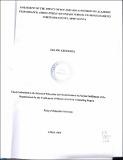Assessment of the impact of boy-girl relationship on academic performance among public secondary school students in Imenti North sub county, Meru Kenya.

View/
Date
2018-04Author
Chiamaka, Eze Joy
Type
ThesisLanguage
enMetadata
Show full item recordAbstract
Boy-girl relationships are expressions of adolescents’ deep and strong emotional desires towards the opposite gender. Boy-girl relationships usually start when adolescents meet with the opposite gender and they develop attraction or feelings of likeness towards each other. Students are expected to concentrate and focus on their studies in order to succeed academically. Boy-girl relationships among adolescents have been suggested as one of the factors influencing students’ academic performance negatively. Poor academic performance has been associated with the emotional and cognitive impact of boy-girl relationships among secondary school students in Imenti North Sub-County Meru. The purpose of this study was to assess the impact of boy-girl relationships among public secondary school students of Imenti North Sub-County, Meru, Kenya. The study was guided by the following objectives: to establish the prevalence of boy-girl relationships among secondary school students, to examine the emotional effect of boy-girl relationships on academic performance among secondary school students, to analyze the cognitive effect of boy-girl relationships on academic performance among secondary school students and to explore psycho-educational interventions implemented to mitigate negative impact of boy-girl relationships on students’ academic performance. The study anchored on the need to belong theory which unveils the motivation behind boy-girl relationships and how maintaining frequent and consistency in the relationship can result to emotional and cognitive issues among secondary school students; which in turn affect their academic performance negatively. The study adopted a descriptive survey design. The target population for this study consisted of 72 public secondary schools; 144 teachers and 1,440 Form three students in North Imenti Sub-County. Random sampling and stratified sampling techniques was used to select 10% of the schools, students and teachers. Seven public schools from Sub-County schools, extra County schools and County schools were chosen to sample the 144 students and 14 teachers. Data was collected by means of self-administered questionnaires and interviews. A pre-test study was carried out on 7 secondary school students and 3 teachers in 2 schools within the neighboring Sub-County, Buuri to ensure the reliability/feasibility of the questionnaire. Validity was assured by careful choice of indicators in line with the objectives and consultation with the supervisors. Data collected were analyzed using statistical package for social sciences (SPSS), organized and presented in charts and tables. A total of 98 students’ questionnaires were successfully completed as well as all the teachers’ questionnaire, hence a 70.9% return rate was achieved. The findings of the study revealed that boy-girl relationships were predominant and widely spread among adolescent students, the emotional and cognitive effect of boy-girl relationships had adverse effect on the students’ performance and teachers (amidst other psycho-educational interventions) played more significant role in mitigating negative impact of boy-girl relationships on students’ academic performance. Thus, guidance and counseling departments in secondary schools should take the high prevalence of students’ past and current engagement into account when designing programs. The policy makers in the health and education sector should design policy of providing students with information about skills and attitudes on interpersonal relationships. Secondary school teachers should occasionally examine and give attention to students’ level of concentrations in their respective classes. Parents, counselors, church leaders and teachers should maintain an approachable attitude for students to discuss their personal issues as it relates to boy-girl relationships. All these can aid to mitigate the negative impact of boy-girl relationships on academic performance among secondary school students.
Publisher
KeMU
